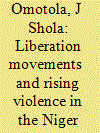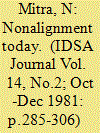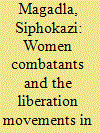| Srl | Item |
| 1 |
ID:
184771


|
|
|
| 2 |
ID:
094765


|
|
|
|
|
| Publication |
2010.
|
| Summary/Abstract |
The contest for the 'soul' of oil and its revenues in Nigeria have thrown up several actors representing diverse interests, most notably the stale, oil multinationals and oil-hearing communities. This paper is primarily concerned with what it called the new contentious site of oil and environmental polities in the Niger Delta. The contention revolves mainly around the interpretations ascribed to the current but unprecedented wave of violence in the region by the contending forces in oil and environmental politics. In the reading of militias' activities, there is a simultaneous convergence and divergence between the state and the oil majors. Both refuse to attribute rising violence to liberation struggles, as claimed by the militants. They, however, differ over the best tactical approach to the problem. The oil majors seem to prefer a more violent approach to taming the monster, which violence in the Niger Delta has become. This is in sharp contradiction to the states' preference for a relatively less violent approach. This 'new' disposition of the state makes it all the more interesting, given the fact that the Nigerian state is notoriously reputed for its excesses in the Niger Delta over dissent. Overall, rising violence in the Niger Delta represents the continuation of the resource struggle by another means. Notable criminal tendencies became inevitable due to the insensitivity of the government and in order to sustain the struggle.
|
|
|
|
|
|
|
|
|
|
|
|
|
|
|
|
| 3 |
ID:
184923


|
|
|
| 4 |
ID:
074913


|
|
|
|
|
| Publication |
2006.
|
| Summary/Abstract |
This article examines the politics of African states in which insurgencies or liberation movements have taken control of the government. It analyses the impact on governance of reforms introduced by these post-liberation regimes, their relations with traditional authorities and civil society and relationships within and between competing guerrilla movements. It interrogates the nature of the state that emerges from this process. The ‘post-liberation’ state label is argued to be both meaningful and useful, as part of a larger project of exploring and explaining the post-colonial African state, highlighting debates about representation, citizenship and nation building. While post-liberation regimes have advantages in implementing state building projects, they are also subject to contestation when the new state institutions and regime incumbents become too exclusivist or predatory.
|
|
|
|
|
|
|
|
|
|
|
|
|
|
|
|
| 5 |
ID:
142054


|
|
|
|
|
| Summary/Abstract |
This article examines women's role as combatants in national liberation forces in South Africa. Three categories – guerrilla girls, combative mothers and the in-betweeners – are introduced to underscore the varied ways in which women have participated in combat within the national liberation movements. Factors such as age and one's ability to leave the country affected whether women could participate in combat as ‘guerrilla girls’ or if it limited them to fighting apartheid violence from home, or if there were women who can be defined as having fallen somewhere in between these categories. These categories are used to theorise women's combat roles in the anti-apartheid struggle, thus broadening and challenging the dominant notions of combat that often hide women's contributions in war. In this regard, different periods of struggle, physical location, as well as age, determined the methods of activism available to men and women.
|
|
|
|
|
|
|
|
|
|
|
|
|
|
|
|